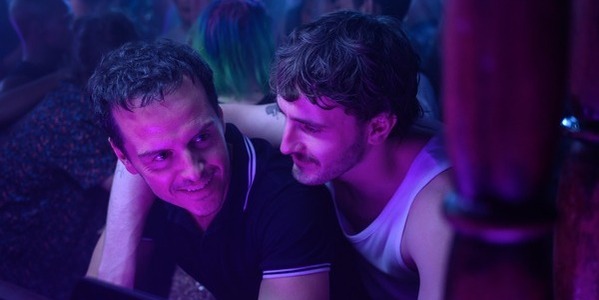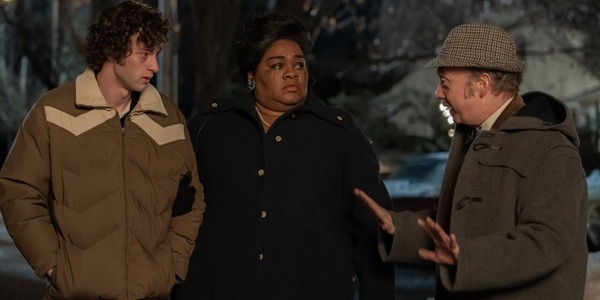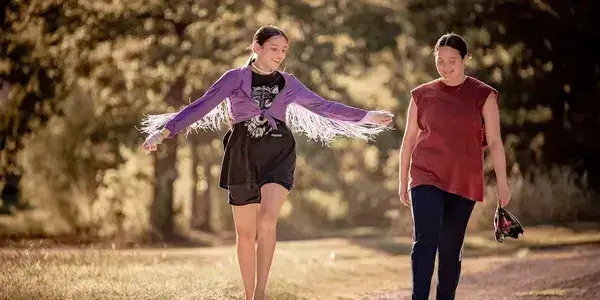Heartland International Film Festival 2023: ALL OF US STRANGERS, THE HOLDOVERS, FANCY DANCE, & SOMETIMES I THINK ABOUT DYING

Alex is a film addict, TV aficionado, and book lover.…
The 2023 Heartland International Film Festival has come to a close, but I’ve got one last report on some of the big titles that ended the festival.
All of us Strangers (Andrew Haigh)

There’s a line in the sand for all of us. One day we’ll be here and the next we won’t. If the cold fact of our impending death isn’t paralyzing enough, we also have to get over other people’s lines in the sand, the deaths that leave deep, devastating marks on our own lives.
Writer/director Andrew Haigh understands the defenses we put up to survive these realities, so he wrenches them away in All of Us Strangers with a simple trick: he removes reality. The film’s blurring of the line between life and death is perfunctory, as simple as Adam (Andrew Scott) running into his long-dead father outside a shop. Of course, he’s invited back home, and of course, his mother is there. It’s as if his parents were frozen the instant before their car careened off the road and left young Adam an orphan, and now they’ve thawed before his adult self.
The quickness with which this unreality is accepted allows Haigh to get right to ripping out your insides. He’s proven time and again that he’s one of our great humanist filmmakers, focused on the here and now of peoples’ experiences, and willing to sit with deeply felt truths until our callousness melts away. That’s what he does with the sparseness of Strangers. He sits you down with Adam and his parents, and alternately sits you down with Adam and his new paramour, Harry (Paul Mescal), and forces the simplicity of what occurs to wash over you.
Simplicity, however, does not mean a lack of specificity. What Adam holds as a knot in his chest are the ravages of a very specific life experience. There’s the loneliness of being the only queer person in your family. There’s the gaping wound of losing your parents as a child. There are layers upon layers of things that have built Adam into the man he is today, hiding in a near-empty apartment building, eeking out a life.
The quiet sadness of this man wouldn’t work without the stunning turn from Scott, who radiates every brittle, broken thing inside Adam. This is a movie where history unfolds with a single sentence, and he lets it all out without overplaying a single second. Equally as impressive are Mescal, Jamie Bell, and Claire Foy, the latter two playing Adam’s parents. Each have moments of personal revelation, but all are there to push Adam out of the rut loss has dug for him. Their roles require a near-impossible amount of tenderness, and the levels they access are wholly unnerving.
The whole film rattles you early and often, my first cry coming so quickly that I was concerned it peaked too early. But Haigh is exploring emotions that have no end, the ones we carry with us until the day we die, the ones that linger in people’s memories of us. Because of this, there’s no way to end Strangers. It requires a grand, haunting exit, and it’s only here that it comes up just short. Haigh takes a swing, but its final images will only follow a few out of the theater.
It doesn’t matter, though. The rest of the film is so incisive, so intimate, and so damn cathartic that it’ll refuse to leave your body. You feel All of Us Strangers. It soaks into your skin, and fuses to your bones. It’s a film about grief and loneliness, and it leaves you with less of both. What a gift.
The Holdovers (Alexander Payne)

Filmmakers love to reminisce about the ‘70s, which isn’t a bad thing since the decade gave us plenty to ruminate on. There’s the Vietnam War, the revolution in American film, and that fashion. Slap a retro logo and some flared pants on your movie and lots of audiences will fall into feel-good nostalgia. Then, just as smoothly, they’ll trip over the decade’s dark underbelly.
That’s what The Holdovers does to you. At first it’s all lighthearted wallowing, the camera wheeling around a boarding school as high school boys prepare for Christmas break. There’s meticulously recreated period detail everywhere, and we pause to luxuriate in it. We’re introduced to Angus (Dominic Sessa), who has an answer for every barb thrown his way. Later, the boys take us to Mr. Hunham’s (Paul Giamatti) class to see just how curmudgeonly he is. Introducing a new chapter before break? Absurd, and Angus speaks up for the class. That loses them all the opportunity for a makeup test, and off goes the pleasant little movie about troubled boys and troubled men doing their best not to think about the looming war.
You’ve seen every aspect of The Holdovers before, from the patter of its dialogue to the bonding that heals its disparate, broken souls. Director Alexander Payne clearly relishes this type of movie, knows it inside and out, and delivers everything you want. What he doesn’t do is surprise you, not even for a second.
Neither does Giamatti, for that matter, who can do a grumpy, broken man in his sleep. His Mr. Hunham is a loveable know-it-all, his intellect so far up his butt that he can’t see the sadness in a boy left alone for Christmas. It’s a difficult role, one that Giamatti should continue to receive praise for with each note-perfect variation he puts on this archetype. More surprising is Sessa is his film debut, who settles nicely into the role when Angus reveals himself as more than just a punk with his guard up. Rounding out the film’s central trio is a great Da’Vine Joy Randolph as Mary, head of the school cafeteria and a grieving mother. It’s these three who get stuck at the school over Christmas, each giving the other what support they have to offer.
What these beleaguered people have isn’t much, though, so most of the film is them picking at each other in clever, haughty ways. This is the kind of film where you laugh at people who are oh so proud of themselves, except the film is just as proud of its own modest delights.
And there are delights. Outside of the aforementioned cast and period wallowing, there’s a smooth build to the film’s inevitable ending, and a few well-executed staples of this kind of film earns real pathos.
Fancy Dance (Erica Tremblay)

Sadly, the bubble of indigenous television is bursting. Rutherford Falls was canceled and Reservation Dogs has gone out on its own stellar terms. Dark Winds carries on, but those sparse offerings were a rare instance of multiple TV shows produced by and about indigenous people on American televisions. The grand hope, of course, is that these shows aren’t the end. They gave directors, writers, and actors ways to build their resumes, and as they disperse more projects should be greenlit for these skilled people.
Coming from that bubble is director Erica Tremblay’s Fancy Dance. Tremblay is a veteran of both Reservation Dogs and Dark Winds, and she makes her narrative feature debut with a spiraling drama about a young woman trying to hold things together for her niece. Like so many indigenous people, her opportunities are scarce, and they were barely scraping by before her sister went missing. Now she’s balancing putting food on the table, pushing the feds to investigate the disappearance and keep her niece’s hope alive.
Films like this, ones that actually come from indigenous filmmakers like Tremblay, crackle from the uneasy mix of cultural influences. Life on a reservation is depicted without glossing over the reality of being semi-sovereign nations. Women disappear, people do nothing, and ICE stops you throughout your day. There’s simmering fury here and necessary resignation to the realities of life as an indigenous person.
Writer Miciana Alise funnels these big ideas through the film’s main character, Jax, and gets a big boost from Lily Gladstone bringing Jax to life. If you aren’t familiar with Gladstone, you’re about to be thanks to Martin Scorsese’s Killers of the Flower Moon. Also, go back and watch Kelly Reichardt’s Certain Women. She’s the kind of actor who can make a movie with a single look, and she needs her full powers to wade through this dense, sometimes clunky story.
Look, this movie has a lot on its mind. The script and the edit would’ve benefited from more passes to smooth things out, especially during the early scenes where it struggles to put everything Jax is up against in context. It trusts its audience to follow her, even as she makes some reckless choices. It doesn’t trust its audience to have a functional knowledge of indigenous people’s lives, which is a fair assumption, but that leads to certain things being stated plainly when an implication would’ve been more powerful.
Behind all of it, though, is Gladstone. She finds truth in the film’s clunkiest moments, which powers the film through these slip ups. She’s paired well with young Isabel Deroy-Olson as her niece, and the two push the film’s emotional core to the fore. The aunt and niece really care for each other, want to stay together, but circumstances with long, deep roots seem determined to pull them apart. Their relationship is the warmth among cold reality, and it makes their journey a poignant one, even when it isn’t smooth.
Sometimes I Think About Dying (Rachel Lambert)

How to make a movie about someone who isn’t understood. That was the task before director Rachel Lambert with Sometimes I Think About Dying, and she just barely found a way through.
The enigma at the center of the film is Fran (Daisy Ridley), who we are introduced to as she gets ready for work. She lives alone, has her routines, and sits quietly at her desk. Her coworkers banter and make nice. No one is outwardly hostile to Fran, but no one pays her much attention. When she gets home she makes a simple meal and relaxes into her favorite activity: imagining herself dead.
These instances of passive suicidal ideation are presented starkly, even within the heightening Fran applies in her head. Her body is always displayed as if in a tableau, the circumstances of her death oddities to be parsed out as if they were part of Frances Glessner Lee’s Nutshell Studies of Unexplained Deaths (is the character name a reference???). Everything about Fran is a study of details. She gives away so little that most will need to study her slightest twitches to understand her. Unless, of course, you’re familiar with this kind of person.
I read her as a very familiar kind of neurodivergent. Her bluntness, her difficulty with social cues, the way her eyes dart to and from eye contact. And the minute details Lambert focuses on from her perspective, are these sensory sensitivities? There’s no clear answer. A diagnosis isn’t given, but something makes it hard for Fran to connect, and her life is small and empty because of it.
The role gives Ridley much to do, and she nails every nervous twitch and overwhelmed shutdown. Given how few people understand neurodivergence, few audience members will understand why Fran is the way she is, but Ridley makes sure you always know how she’s feeling.
In a more demonstrative role, Dave Merheje brings a spark of light. His Robert is the new guy at the office, and he finds Fran’s oddities intriguing. Or, the film says he does. The reason he reaches out isn’t fleshed out too clearly, and neither is the rest of their relationship. It’s the film’s biggest miss, the lack of palpable attraction between the two, and it’s near deadly considering how essential it is to Fran’s tentative blossoming.
But even when their relationship as a whole isn’t making sense, the moments they find together are revealing. When they’re invited to a party, we observe how Robert moves through the group of strangers with nerdy easy while Fran hangs back. She seems almost overwhelmed by the excitement, especially when the party turns to her particular interest. It’s a murder-mystery party, and she’s an expert at unusual deaths. No one understands her input, but her oddity, in this context, is charming. We see, for a brief moment, how she could fit into people’s lives.
But then the film treats the party as a breaking point for Fran and Robert. It’s a jarring turn, one that feels forced by narrative need instead of by the events preceding it. Moments like this, along with some misplaced humor, give the uneasy impression that Lambert and company didn’t have a firm grasp on the character they’re examining. It’s an understandable fault. Fran is a difficult nut to crack, but luckily Ridley got in there and made her feel complete. Without Ridley, the film would’ve tripped over its own concept.
All films screened at the Heartland International Film Festival.
Does content like this matter to you?
Become a Member and support film journalism. Unlock access to all of Film Inquiry`s great articles. Join a community of like-minded readers who are passionate about cinema - get access to our private members Network, give back to independent filmmakers, and more.
Alex is a film addict, TV aficionado, and book lover. He's perfecting his cat dad energy.













